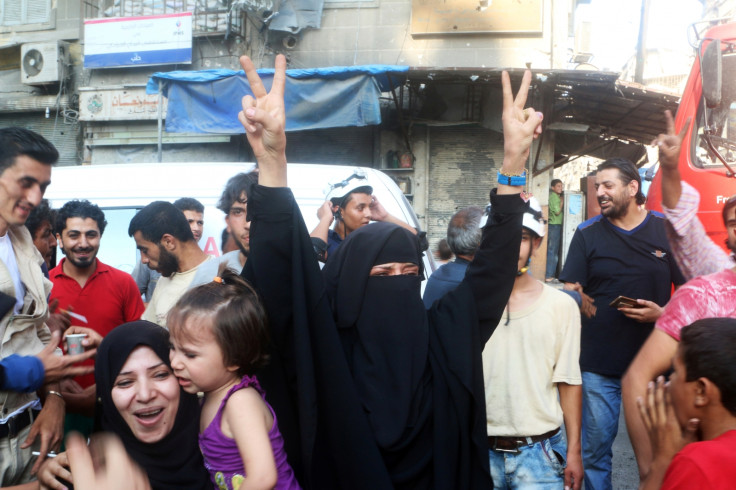Syrian rebels claim to have broken Aleppo siege amidst heavy fighting
Bashar al-Assad's forces and pro-regime media outlets have denied the rebels' claim.
Intermittent clashes were reported on the southern edges of Aleppo on Sunday morning, 7 August, after a Syrian rebel coalition declared that they broke through the regime siege in eastern Aleppo on 6 August, following an attack on a military academy, militants and a monitor group said. Hours later, people of eastern Aleppo could be seen rejoicing and celebrating in the streets.
According to Reuters, the claims have been denied by sources close to Bashar al-Assad's forces and pro-regime media outlets saying that they have driven the militants back from an artillery base. Rami Abdel Rahman, head of Syrian Observatory, said "Not a single civilian has left the eastern districts because the road is too dangerous and not secured,"
The rebel coalition, that includes Jabhat Fateh al-Sham, former al-Qaeda affiliate Jabhat al-Nusra and Ahrar al-Sham, have been making efforts to break through a thin strip of regime-held area to reconnect it to insurgent areas in western Syria, effectively breaking the siege of the government that began last month.
US State Department officials told Reuters "We've seen reports but the situation is fluid and we aren't going to provide battlefield updates."
The battle to capture the Ramousah military academy that comprises of several military colleges, started on Friday, 5 August. Capturing Ramousah and connecting with eastern Aleppo would essentially segregate the regime-held western Aleppo by cutting off links to the southern route that leads to Damascus.
#Breaking: Rebels break #Aleppo's siege. Dozens of #Assad & #Hezbollah forces were killed & hundreds escaped#Syria pic.twitter.com/UXTDWTkFZR
— Syrian Coalition (@SyrCoalition) August 6, 2016
However, the victory is seen as fragile. The region is still a war zone and it could take some time before a secure route for food and medical supplies is set up, the Guardian reports. The Britain-based Syrian Observatory for Human Rights (SOHR) said the rebels had indeed broken the siege but the path was "not fully secure yet".
Zaher Sahloul, a Syrian-American doctor who co-ordinates medical aid in the city, said: "We expect revenge bombing by the regime, including, possibly, chemical weapons."
In an online statement, Jabhat Fatah al-Sham, said: "Fighters from outside the city met their brother fighters from inside the city, and work is under way to establish control over remaining positions to break the siege."
A commander from a moderate rebel group told Reuters that it was still early days and things were not easy. Around 500 fighters from both government and rebel forces have been killed in the latest wave of attacks, the SOHR said. It is considered the biggest defeat the Assad government has suffered since Russia intervened in September 2015.
Fawaz Gerges, professor of Middle Eastern politics at the London School of Economics, told the BBC: "It has been able to score some major gains in the past 48 hours. The question is not whether the opposition has made some progress or not [but] whether they can really maintain the areas that they occupy and whether they can consolidate it."
Separately, the observatory said an air strike on a hospital in Meles, over 15km (9 miles) from Idlib city, killed 10 people on Saturday (6 August), including children. A medical charity said July was the worst month for attacks on hospitals in the war-ravaged country.

© Copyright IBTimes 2025. All rights reserved.





















